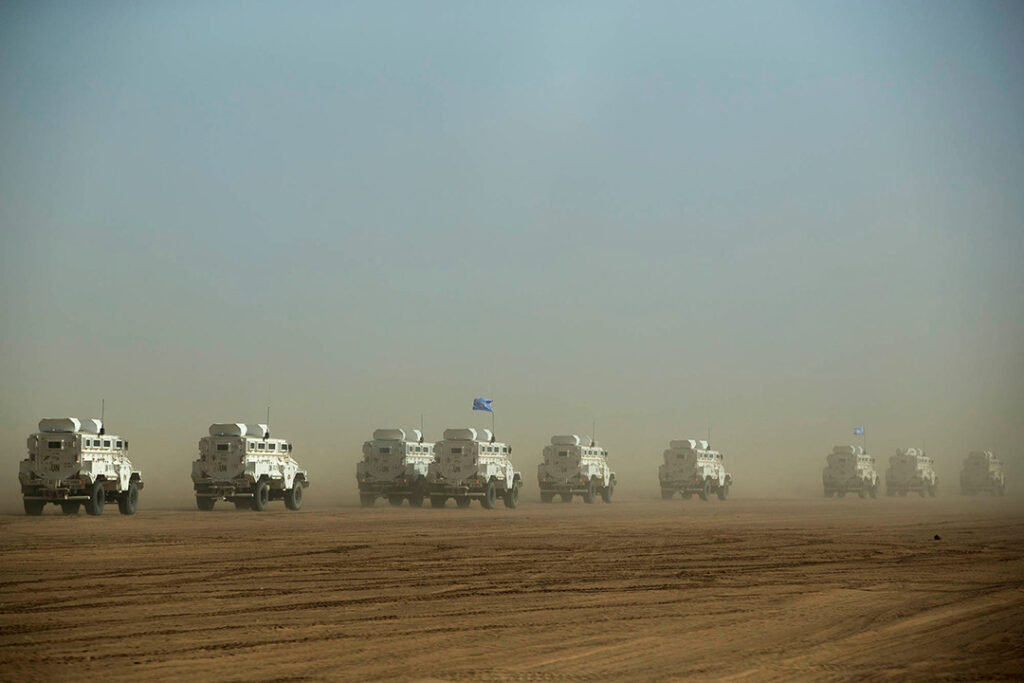ADF STAFF
Peacekeepers are on the move across Africa. But rather than rushing in to quell violence, they are withdrawing from some of the continent’s worst conflict hotspots — the Democratic Republic of the Congo (DRC), Mali and Somalia.
Experts question whether these countries and their neighbors are ready for the end of the multilateral missions and are warning of security vacuums that could be extremely difficult to fill with internal and regional forces.
The two United Nations missions — MONUSCO in the DRC and MINUSMA in Mali — and the African Union’s ATMIS force in Somalia are in various stages of withdrawal, but insecurity continues to rise.
Three researchers at the South Africa-based Institute for Security Studies (ISS) — Dawit Yohannes, Meressa Kahsu and Andrews Atta-Asamoah — say that political, not security, considerations have led to these troop drawdowns. They warn that civilians could pay an awful price when the missions are shuttered.
“While these missions haven’t met all their host countries’ expectations, they have helped prevent state collapse,” they wrote in an October 10 article.
“Current developments particularly in Somalia, Mali and the DRC suggest that removing peacekeepers would create a significant security gap, leading to more violence and worsening humanitarian conditions.”
Half of the U.N.’s 12 peacekeeping missions are in Africa, comprises about 86,000 military, police and civilian personnel. MONUSCO and MINUSMA, two of the biggest and most expensive operations, are working to fully withdraw by the end of 2023.
“The end of MINUSMA will not precipitate the collapse of other U.N. missions,” Crisis Group, a non-governmental organization and think tank wrote in July. “It points the way toward the end of an era for large-scale blue helmet missions in Africa. With MONUSCO also slated to close in the near future, the U.N.’s military footprint on the continent will be markedly smaller compared to just a few years ago.”
Since 2000, about 27 African-led peace support operations and more than 13 U.N.-led missions have incurred billions of dollars annually and cost thousands of peacekeepers’ lives on the continent.
U.N. Secretary-General Antonio Guterres has called for “a new generation of peace enforcement and counter-terrorism operations led by regional organizations,” particularly in Africa. His new Agenda for Peace, launched at the end of 2022, would spur “an overhaul of multilateralism.”
“Peacekeeping operations where there is no peace to keep don’t really make much sense,” he said on June 22, according to Le Monde newspaper.
U.N. peacekeeping chief Jean-Pierre Lacroix recently said that for civilians on the front lines of conflict, “the presence of peacekeeping missions stands as an important deterrent to an even grimmer reality.”
“Peacekeeping is not a magic wand to help a country return to stability,” he said in an address to the Security Council on September 7. “But with the support of a unified international community, political processes and peace agreements have been implemented.”
In his address to the Security Council, Britain’s deputy U.N. ambassador James Kariuki urged MINUSMA and MONUSCO to implement lessons learned from past peacekeeping transitions.
“We should be wary of time-based, rather than conditions-based, withdrawals of peacekeeping operations, which put lives and peace processes at risk,” he said.
As the DRC, Mali and Somalia already have seen increases in violence this year, the ISS researchers said that regional forces, local militias and mercenaries have not shown the capacity to meet complex security challenges.
“Worsening insecurity after peacekeepers depart shows the need for circumspection in demands for troops to leave,” they wrote. “There is also an urgent need to develop robust alternatives to fill the resulting security vacuum. Thus far, national and regional efforts have not matched the severity of the threats following the peacekeepers’ withdrawal.”
Fearing a security vacuum in Mali, most observers were surprised by the military junta’s request for MINUSMA to withdraw.
Crisis Group experts Jean-Hervé Jézéquel and Ibrahim Maïga believe that with an estimated 1,000 Russian Wagner Group mercenaries deployed, Mali does not have a reliable alternative to the U.N. mission.
“MINUSMA does not have the means to resolve the Malian crisis, but it has provided a military presence in urban areas and resources that many deemed too valuable for Bamako to forgo,” they wrote in a June analysis.
The two also made note of Djibo, Burkina Faso, where the population has suffered in the clutches of a militant blockade for more than a year. MINUSMA’s withdrawal, they said, may prompt extremist organizations to “reassess their strategy and lay siege to urban centers.”
“The Malian authorities nonetheless appear to believe that Mali’s armed forces, with the support of their Russian allies, can maintain control. But the government has yet to reveal its plan for filling the vacuum left by MINUSMA.”

